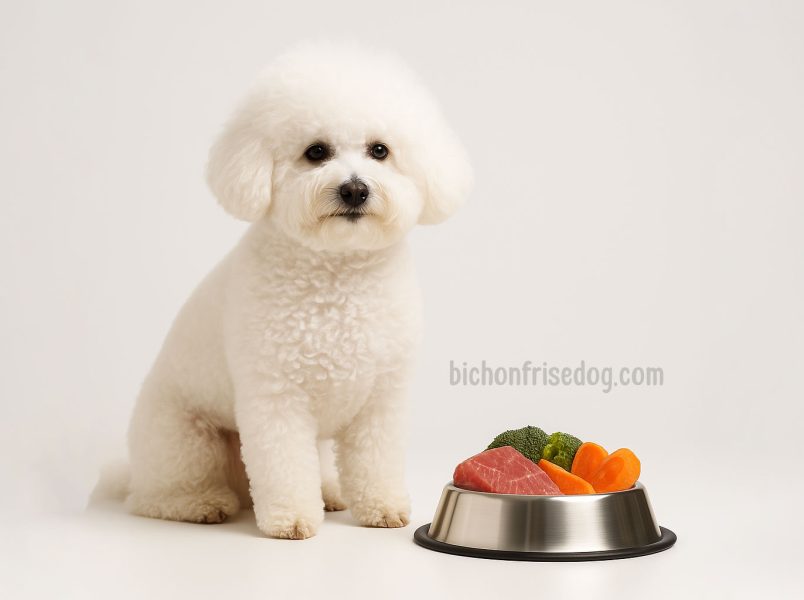A well-balanced diet is one of the most critical foundations for keeping a Bichon Frise healthy, happy, and energetic throughout their life. Because this breed is prone to skin allergies, digestive sensitivities, dental disease, and liver issues, careful attention to nutrition is essential from puppyhood to their senior years.
In this complete guide, we’ll explain the best dog food for Bichon Frises, special diet recommendations, and how to ensure your fluffy companion thrives at every stage of life.

🥗 Balance is the key to a healthy life
According to leading veterinary nutritionists, an adult Bichon Frise’s diet should ideally consist of:
- Animal protein (65% – 75%): The core of the diet. Essential for muscles, immune health, skin, and coat.
- Fats (10% – 15%): Healthy fats like fish oil, coconut oil, olive oil for energy, brain, and coat health.
- Vegetables & fruits (10% – 15%): Cooked vegetables and fresh fruits for fiber, antioxidants, and vitamins.
- Carbohydrates (5% – 10%): Prefer complex carbs like sweet potato, quinoa, brown rice if needed for energy.
- Supplements (optional): Omega-3, probiotics, digestive enzymes if needed.
📅 How diet percentages change by age
Because nutritional needs change depending on the life stage, here’s a breakdown:
🍼 Puppies (0–12 months)
Protein: 70–80%
Fat: 15–20%
Vegetables/Fruits: 5–10%
Carbohydrates: Minimal (optional 5%)
Reason:
Puppies need extra protein and fat to support rapid growth, brain development, and immune system maturation.
Fat acts as a major energy source during growth.
🦴 Important: Ensure calcium and phosphorus are balanced properly to avoid developmental orthopedic disease (especially if doing homemade or BARF diets).
🐕 Adults (1–8 years)
Protein: 65–75%
Fat: 10–15%
Vegetables/Fruits: 10–15%
Carbohydrates: Optional 5–10%
Reason:
Once mature, the focus shifts to maintenance: maintaining healthy weight, strong muscles, and good digestion.
Excess fat should be avoided to prevent obesity.
🐾 Seniors (8+ years)
Protein: 60–70%
Fat: 5–10%
Vegetables/Fruits: 15–20%
Carbohydrates: 5–10%
Reason:
Senior Bichons have slower metabolism and are prone to obesity, arthritis, and liver issues.
Reduce fat intake to avoid fatty liver disease or lipomas.
Increase fiber (from vegetables) to promote easier digestion and healthy bowel movements.
High-quality protein is still essential to maintain muscle mass and immune strength.
💡 Tip: Lean meats like turkey, chicken breast, and white fish are ideal for seniors.

🚫 Why avoid commercial dry kibble and highly processed foods?
Commercial kibble—even premium brands—often contains:
High levels of carbohydrates (up to 60%)
Low-quality protein substitutes (by-products)
Artificial preservatives and flavor enhancers
Fillers like corn, soy, and wheat
Numerous veterinary studies (such as those from the American College of Veterinary Nutrition) have linked poor-quality diets to:
Chronic allergies
Diabetes mellitus
Obesity
Kidney and liver disease
Increased risk of cancers
Feeding your Bichon Frise a natural, minimally processed diet is the best investment you can make in their long-term health and happiness.
👩⚕️ Why personalized nutrition matters for Bichon Frises
Not every Bichon Frise has the same nutritional needs. Factors such as:
Genetics
Activity levels
Pre-existing conditions (liver disease, allergies, dental problems)
Weight management goals
can significantly affect dietary requirements.
⚠️ Warning: Nutritional mistakes like excessive calcium, wrong fat ratios, or too much liver can lead to serious imbalances over time.
That’s why consulting a veterinary nutritionist is highly recommended to create a customized meal plan, especially if transitioning to raw or homemade diets.

🐾 Final thoughts: natural food is the best for your Bichon Frise
Feeding your Bichon Frise fresh, natural, and species-appropriate food is not just a health choice, it’s a profound act of love. Every bowl of wholesome food builds stronger muscles, sharper minds, better digestion, and a more resilient immune system. It also gifts you more years of joyful companionship with your fluffy best friend.
Switching away from processed commercial foods was the best decision I ever made for my Bichons and it transformed their lives for the better.
👉🏻 I have another post that lists the types of foods your Bichon Frise can eat.
